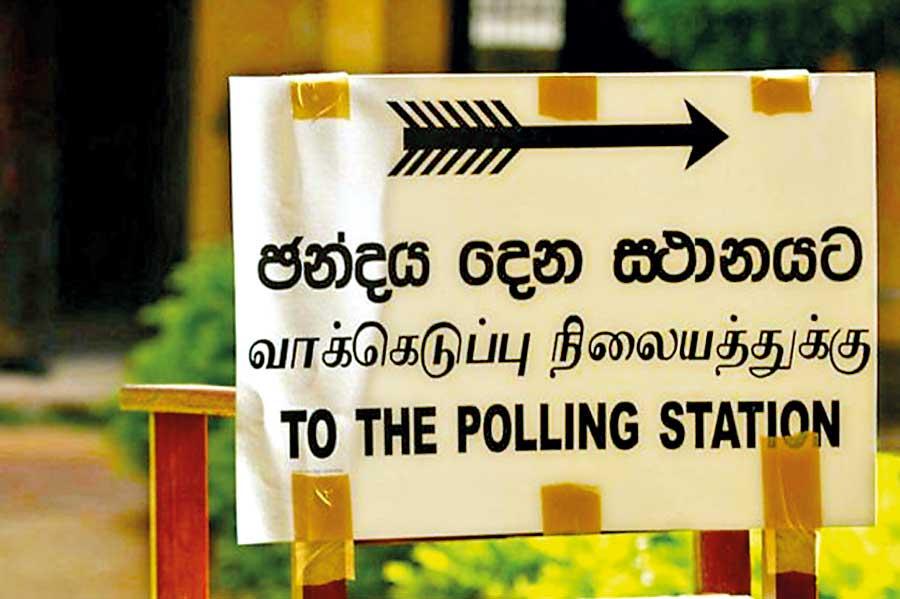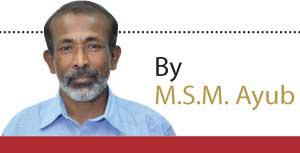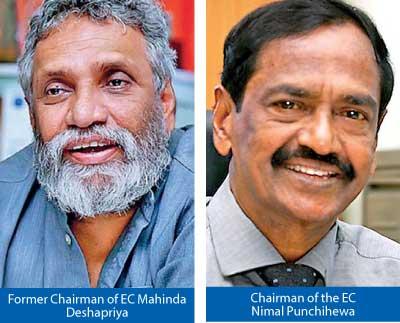Reply To:
Name - Reply Comment

 What the leaders of the government had forgotten or what they wanted the people of this country to forget was that a PSC had been appointed to recommend electoral reforms in May 2021 under the chairmanship of none other than Prime Minister Gunawardena who was then only a minister What the leaders of the government had forgotten or what they wanted the people of this country to forget was that a PSC had been appointed to recommend electoral reforms in May 2021 under the chairmanship of none other than Prime Minister Gunawardena who was then only a minister |
It is very clear even to a child that the two parties in the government, the United National Party (UNP) and the Sri Lanka Podujana Peramuna (SLPP) are hell-bent on postponing the local government elections that is scheduled to be held in March. The attempts now have gone to a shameless extent.

Showing the country, a seemingly well-intentioned plan has been the modus operandi of these two parties, especially that of the UNP led by President Ranil Wickremesinghe in most of their attempts. It was the same way the previous government led by the UNP postponed the provincial council elections in 2017. The then government introduced the mixed electoral system which had then been accepted by all political parties, for provincial councils and later scuttled the delimitation process, resulting in the PC elections running into a stalemate till to-date.
It was the UNP that started to suggest moves that would possibly defer the LG elections this time as well. President Wickremesinghe declared during a meeting with professionals on October 9, last year that the number of members of the local government bodies would be reduced from 8,000 to 4,000. The Opposition parties, while acknowledging the need to downsize the LG bodies, suspected the intention of the President. They immediately accused him of planning to postpone the elections.
Yet, the government went ahead with its plan with Prime Minister Dinesh Gunawardena who is also the Local Government Minister appointing a delimitation committee in the first week of November, under the chairmanship of Mahinda Deshapriya, the current Chairman of the National Delimitation Commission. Disregarding the assurances by the government on elections being held as scheduled, Opposition parties then took even Deshapriya to task. However, Deshapriya who is a former Chairman of the Election Commission (EC) very cleverly saved his skin by claiming that the Election Commission can go ahead with the elections ignoring the delimitation process started by his committee.
Since his statement put the government in a difficult situation, it had to find alternative ways to achieve its objective. Accordingly, leaders of the government planned last month to appoint a Parliamentary Select Committee (PSC) to recommend amendments to the Local Government Elections Act, including downsizing the LG bodies. Justice Minister Wijeyadasa Rajapakshe had told The Sunday Times that he had discussed this matter with Prime Minister Dinesh Gunawardena and the PSC will present its report within two weeks so that its recommendations could be implemented without postponing the local government elections.
What the leaders of the government had forgotten or what they wanted the people of this country to forget was that a PSC had been appointed to recommend electoral reforms in May 2021 under the chairmanship of none other than Prime Minister Gunawardena who was then only a minister. He had presented its report to the Parliament on June 22 last year. However, the government did not proceed with appointing another PSC, as the Justice Minister said.
 Last month the Chairman of the Election Commission Nimal Punchihewa had sought the opinion of the Attorney General (AG) on holding the LG elections. Then, Janatha Vimukthi Peramuna (JVP) leader Anura Kumara Dissanayake while reminding by insinuation, the past political affiliations of the EC Chairman, questioned in Parliament the rationale behind his seeking AG’s opinion when the LG polls had been postponed only for a year since February 2022. However, the polls chief announced last month that the nominations would be called for the LG elections at the end of the month.
Last month the Chairman of the Election Commission Nimal Punchihewa had sought the opinion of the Attorney General (AG) on holding the LG elections. Then, Janatha Vimukthi Peramuna (JVP) leader Anura Kumara Dissanayake while reminding by insinuation, the past political affiliations of the EC Chairman, questioned in Parliament the rationale behind his seeking AG’s opinion when the LG polls had been postponed only for a year since February 2022. However, the polls chief announced last month that the nominations would be called for the LG elections at the end of the month.
However, it did not materialize. Nonetheless, a retired Army Colonel, W.M.R. Wijesundara filed a writ petition in the Supreme Court against the move by the EC to hold elections on January 2, two days before the EC announced nominations dates. The petitioner questioned the benefit to the country by spending Rs.10 billion for an election at a time when the country is facing an economic crisis. This was an argument that has been parroted by the politicians of the government lately. However, the EC on January 4 announced that the nominations for the polls would be accepted from January 18 to 21.
Yet, President Wickremesinghe on January 6 summoned the members of the EC to the Presidential Secretariat where he asked them to resolve the differences among them on holding the election and the media reported the next day that there were four different opinions among the members of the EC on the matter. The President had reportedly asked during the meeting whether the EC consulted the Education Ministry since the election process could affect the national exams.
However, the polls chief Punchihewa on January 9 stated during a TV interview that there was no disparity among opinions of members of his commission, claiming that all three gazettes issued thus far on the LG election were signed by all members of the commission. He also dismissed the widely circulated notion that elections would cost the public coffers Rs. 10 billion. He said that amount would be less than Rs. 10 billion and the EC did not need the funds at once.
Opposition parties and the election monitoring NGOs have described the meeting between the President and the members of the EC as an unethical move by the executive while JVP leader Dissanayake said the President should not have summoned the EC as he is the leader of the UNP. He also stated that summoning the EC members instead of visiting the Elections Secretariat is misusing the Presidential powers.
Parliament was to take up in the meantime a private member’s Bill on the LG elections which provides for the inclusion of 25 per cent of youth members in local government bodies. Interestingly, this Bill had been presented while another private member’s Bill by Samagi Jana Balawegaya (SJB) member Imthiaz Bakeer Markar for the same purpose had been handed over six months ago. There was a verbal clash between the ruling party and the Opposition in Parliament on January 6 over taking up Dolawatte’s Bill first. The Opposition said that the government’s motive was to postpone the election using the Bill.
Meanwhile, Secretary to the Ministry of Public Administration, Neil Bandara Hapuhinna had sent a letter to the Returning Officers on January 9 instructing them to stop accepting deposits from the candidates contesting the LG elections, until further notice. However, on the same day, he had withdrawn the letter. Media reported that Hapuhinna had sent this letter in accordance with a decision by the Cabinet. Nobody denied it immediately, but later the Prime Minister denied it on January 18, in Parliament.
Another controversy broke out on Wednesday (19) in Parliament over the taking up of a Bill (The Regulations of Election Expenditure Bill) meant for controlling the election expenses by candidates. The Opposition said they were not against the Bill, but passing it at a time when an election is declared might result in the postponement of the election. Election monitoring groups also had expressed the same fear. However, the Bill was to be debated yesterday, amidst protests by the Opposition.
Nevertheless, the Election Commission had been firm on holding the election in March. It has given an undertaking to the Supreme Court as well to hold the election as scheduled.
This long list of actions by the government and its allies simply and very clearly shows their intention. The EC chairman also had told the Daily Mirror last month that he was planning to hold the elections in March as scheduled while stating in the same breath “I don’t know whether there would be any legal or Constitutional impediment in the days to come”. One has to guess as to why the government is attempting to bring in changes in the LG election law in various ways, while the election is around the corner and also why the government wants to defer elections at this juncture.
Moves that would have been hurdles on the way to the election
October 9 - President proposes to reduce the number of members of local government bodies from more than 8,000 to 4,000
November - PM appoints a delimitation committee for LG bodies
December - Government plans to appoint a PSC to make changes to LG Elections Act
January 2 - Army Colonel files a writ petition against holding elections
January 6 - President tells EC to resolve the differences and reminds national exams
January 6 - Government wants to take up Dolawatte’s Bill on LG elections
January 9 - Secretary to Ministry of Public Administration sends letter to ROs asking to stop accepting deposits
January 19 – Election expenditure bill to be debated